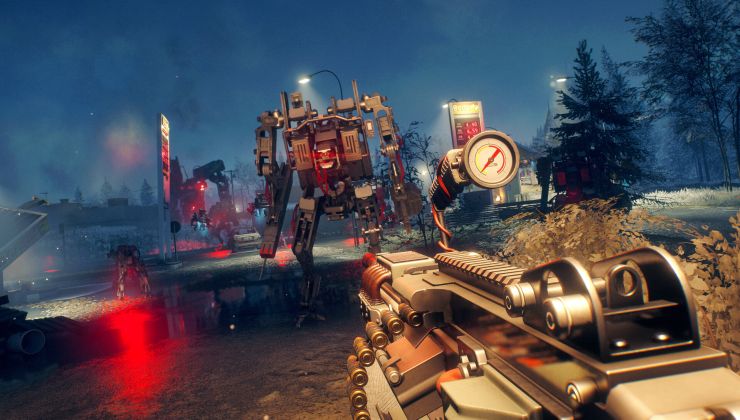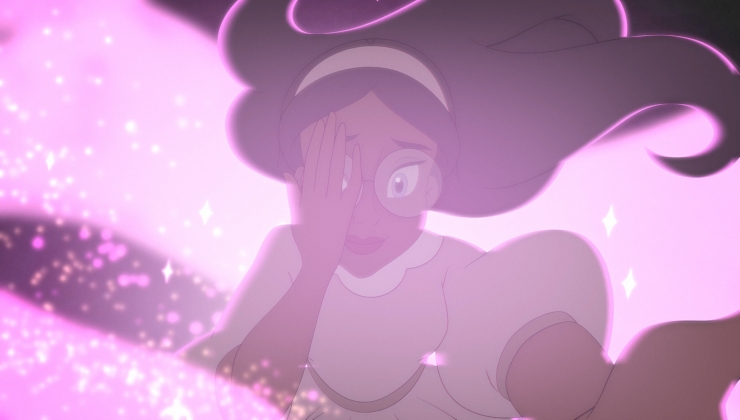The 2D adventure game Shipwreck is now available on Steam. It's been covered previously before when it was only available for Linux gamers via Desura and the Humble Store.

Shipwreck features a distinctively retro style which recalls the best of the 16-bit era of consoles. There are clear Zelda influences in its design and approach; an array of equipment and upgradable health/hearts being the most prominent. Gameplay is centred around exploring an area replete with dungeons and monsters in order to find a way off the island.
You can get the game from your choice of online retailer through its official site. It's worth mentioning that the game is rather cheaply priced and is currently currently discounted even further for a few days.

YouTube videos require cookies, you must accept their cookies to view. View cookie preferences.
Direct Link
Direct Link
Shipwreck features a distinctively retro style which recalls the best of the 16-bit era of consoles. There are clear Zelda influences in its design and approach; an array of equipment and upgradable health/hearts being the most prominent. Gameplay is centred around exploring an area replete with dungeons and monsters in order to find a way off the island.
You can get the game from your choice of online retailer through its official site. It's worth mentioning that the game is rather cheaply priced and is currently currently discounted even further for a few days.
Some you may have missed, popular articles from the last month:
Quoting: BeamboomA big thanks to you too, Keizgon, for taking your time. Great reply.Likewise, I enjoy a civil conversation no matter the point of view. Though time is limited, so I will tread off as my last response to this subject. :)
Quoting: BeamboomJust as a footnote: The same is the case for the home computers of the 80s, or the PC. The consoles are the only devices designed for gaming.
Exactly in what way are consoles only meant for gaming? They were designed for social (shared) experiences and accessibility (cost). This has been shifting to an entirely unstable marketing area as modern devices start to embrace additional non-gaming designs to them. It's starting to draw the line for consumers to realize they're just PCs, but in an uncomfortable closed environment of paid services layered of more paid services.
This is where it's interesting to see where Steam machines go and are perceived at by wide audiences. Despite what happens (good or bad) as a result, it will be leaving a mark in console history to shake the faith of couch audiences.
Quoting: BeamboomBut that doesn't mean that a retro game can't ever work on a smartphone, and I am surprised if no dev has cracked that "input-code" yet for their retro games.
It has nothing to do with "cracking it". It has to do with the market saturated with an unregulated input design. The wild west of cash grabs and amateur game philosophy. It is very easy to get alienated in this market space for games, so giving up before you find it is not uncommon.
Quoting: BeamboomI essentially agree when we talk about the traditional genres. Like my example with Trine in my earlier reply. My point is this: When there are no core differences, why not pick the alternative that looks light-years better? Why bother sitting there with sprites and beeps from the 80s when you can get the same core experience wrapped up in the beauty and fluidity of, for example, Trine. There's plenty other examples of current games that offer essentially the same, only executed so much better!
Then there's genres that's enjoys huge gameplay/mechanical advancements, prime examples being the simulators and the strategy games. The old ones really can not compare in any way shape or form with them, when it comes to complexity, AI and features. As an additional bonus they also look much better. But that's a bonus.
Not going to debate game-play and art decisions together. A sprite can be drawn and still perform the same tasks the physics engine requests from it. Whether it is practical in certain situations, is a different subject matter and is ultimately up to the artist.
While I'm not a music composer of any kind, I can only assume this holds true in a similar sense as an art form discussion. Again, mixing things together as the presentation doesn't give you the justified slice of the pie for objective interpretation of art.
Whether you like this argument or not, art (visual, audio, writing, etc.) is subjective. It always has been, so what looks better to you doesn't mean what looks better to me. From an artist's perspective, I can objectively say that a piece (representation) was drawn with no thought of shading/light source/colour theory/etc. making it result in an abhorrent mess representing a 5-year old drawing. Believe it or not, those traditional art design choices still exist in digital mediums and what you know as "pixel art". Believe me, I will scrutinize a game for this (with some rational restraint) because being an artist inherently makes you a critic as a byproduct of a never ending cycle of improving.
What separates you and me, are our ideas of what the outcome should be. My only interest is the artist's consistency of the presentation. Yours is the interpretation, assuming you just want to consume a product. You can only say it is subjectively inferior to your interpretation.
Quoting: BeamboomI'm a HUGE fan of VR and the potential that comes with it. Super-excited. And I can clearly see myself in around a decade from now arguing the same way for VR-games:
Why the heck bother with games that only support a 2D display, when you can get that SAME kind of content only embedded in a virtual, 360 degree 3D experience?!
My personal opinion is VR's strong point isn't going to be necessarily games (at least not starting out) that drive the actual interest, but experiences that it provides as a platform. I can easily see well structured Visual Novels (no, I don't mean exclusively Anime/cartoons) being that potential foundation. I want to compare the concept to a structured "dream" world someone designed, where books were the guided sandbox for an imagination in the entertainment medium.
But I'm talking about something that isn't commercially polished or matured yet, so who knows?
Quoting: BeamboomNope I haven't. :( I've noticed the high metascore of that game though.
I have tried a few popular retro games, like that super meatball game, and others that's spoken greatly of. And after a few minutes I always - ALWAYS - end up thinking, "why do I bother with this? I'd much rather spend my time to play <insert comparable modern game here> again!".
Well if there was a "retro" game to accurately represent what makes those games a great experience, it would be Shovel Knight, not Super Meat Boy. Its enjoyability isn't designed around speed running for game-play like that is.
0 Likes
Beamboom, for the record, I enjoy civil conversation and thanks for taking the time to reply. However, I'm going to enjoy trying to pick apart your arguments :D
Here you are simply confusing cultural norms for quality. Language changes and so do values. There are universal truths in creative media which are common to humans in all ages. Themes of love, alienation and redemption are universal throughout the history of literature. However, styles change. Word choice and usage as well as preoccupation about cotillions, the plague, the Hellenistic pantheon are matters that come in and out of fashion. It's never a linear progression. How stories are told and what topics are in them change back and forth from generation to generation.
I love Hemingway and he's a break with a lot of convention of his time. A lot of modern authors mimic him. His terse style is (in)famous. Yet some authors, both contemporaneous and modern, reject that entirely and have since his time written in their own styles. Compare it with any other movement in art and you'll find similar developments. There's always people who want to return to the 'basics', others who create increasingly elaborate things and others who try to do a break with the former entirely. I don't disagree that there are identifiable traits for 'periods' in art but it's never something that always changes either for the better or perpetually into something else.
You clearly don't watch enough movies! All those things are false, save for perhaps camera technique. There are unquestionable advances in technology that factor in there but isn't necessarily reflected in the quality of the final product. Though it's tangential to my central argument I think it's important to point out that the *vast* majority of content is still produced unambitious with a single camera or with a three camera setup using the same types of shots and angles as generations ago. CGI is the only thing that's improved and it's been used to disastrous effect in modern movies because most directors (who you claim have improved) use it for everything instead of tiny little touches and alterations. I could rant for days about all specific major actors, directors and screenwriters (cough *Lindelof*) and how they're anything but improved from the greats but that's getting too far away from the primary point I'm making.
All the so-called improvements that you've pointed out did nothing for the second Star Wars trilogy, nor did it do anything for the Total Recall remake nor has it made any film in the last decade more outstanding than stuff like The Searchers, The Killers, Life of Oharu, Chinatown, Blade Runner, The Great Dictator, Stalker, Terminator or Alien to name a few examples. You may argue that that's because individual techniques weren't applied properly but I fail to see how your average actor or director has gotten any better (and would love examples).
I get where you're coming from here. But it won't necessarily. A lot of what you praise about Trine and any other new game boils down to art direction. Choosing the color palette, the type of instruments and the general feel of things is a very important part of it. Just because it's newer and flashier doesn't mean it will execute what it's going for better. Sometimes simpler things visually are better because they leave things to the imagination - and that's a powerful technique content creators use even despite sometimes having better tools. Sure something with the latest 3D graphics can do a scene as well or better than older styles but that's not a guarantee made by the technology itself. It's a thing that's determined by the art director and content creator. That's the point I was making with the movie talk. And a lot of this older stuff used their available resources in a way that was so effective that changing it would take away from the intended experience.
I think remakes illustrate this rather well. In video games there's loads of examples both good and bad. Simply updating graphics and sound isn't enough to make something good. It can be but it boils down to mostly the little touches. And that, I think, is independent of technology. I would readily concede that the Resident Evil Remake (haven't played the latest remaster) is superior to the original but the Mega Man X PS remake was inferior. Both are technically better than their originals and have (mostly) just gotten graphical and audio updates with gameplay (mostly) intact but MMX doesn't sound as good and it doesn't look as charming as the detailed original sprites and backgrounds. Translating this into new games: I care a lot more for art direction than shiny things because I know it's not just a simple interchangeable component of a game.
I never made that claim. They fall under the broad scope of art=creative endeavor but that's all I said. Insofar that it matters for the sake of argument is that technique and how you execute it is independent of technical ability. That's the point I was making. There's different ways of doing things with different mediums and styles.
I would, however reject the argument that a particular medium has more "art" in it than any other. I think that's up to the individual to appreciate depending on how it speaks to him. But that's neither here nor there and certainly not related to the other points I'm making.
This is where we disagree fundamentally. I've been saying that there's no objective facts to criticize for these games. At least none in the sense that you're presenting.
Dying Light has technical problems. The criticism there is about performance and bugs! That is objective because you can measure FPS and draw distance or sound crackling or any other myriad of technical issues. I haven't really seen anyone criticize the storytelling nor the core gameplay mechanics. At least, not as much as aforementioned issues.
Yeah, there definitely objectives standards within art. But those are all, again, technical critiques. A music professor will tell you whether or not your pitch is within range or if your guitar isn't tuned to the right key. Or how to best operate your instrument so that you can get a full range of sound more easily. But he can't very much tell you, in an objective manner, if the type of music you create is good or bad! In fact the history of music is filled with prominent experts on technical stuff criticizing the type of music people create. Beethoven, Berlioz, Sibelius, early jazz, Glass, Dylan and many many others were highly criticized for not conforming to technical norms and styles of the time.
Yeah, you're free to have your opinion on what you like or you don't and I think we both agree on that :)
But I hope that you realize that things aren't as objective as you're arguing they are. I think that implementation of technique is much more important than technique itself. You can criticize performance of a game, any bugs you encounter and certain design decisions as objective fact (in the latter category think of stuff like not being able to jump to a certain height, enemies/traps that instakill you, load times etc) but the rest I don't think is objective at all. How music and graphics are used to create an effect in their particular style, however, is completely subjective. That's because how you react to it is really up to the individual. As with the example of remakes, sometimes they work sometimes they don't. And that's up to every person to decide why.
Quoting: BeamboomI can usually tell within the first three pages roughly what decade a sci-fi book was written in. Not on the YEAR, but there's a notable progression in how the stories are laid out, the complexity and topics raised and obviously the language. I am pretty sure fans of other genres would agree in regards to their respective genres too.
And in regards to movies: A movie have to be of the really, really excellent kind, the absolute peak level of quality for that time, for me to be able to see past the aging of the movie.
Here you are simply confusing cultural norms for quality. Language changes and so do values. There are universal truths in creative media which are common to humans in all ages. Themes of love, alienation and redemption are universal throughout the history of literature. However, styles change. Word choice and usage as well as preoccupation about cotillions, the plague, the Hellenistic pantheon are matters that come in and out of fashion. It's never a linear progression. How stories are told and what topics are in them change back and forth from generation to generation.
I love Hemingway and he's a break with a lot of convention of his time. A lot of modern authors mimic him. His terse style is (in)famous. Yet some authors, both contemporaneous and modern, reject that entirely and have since his time written in their own styles. Compare it with any other movement in art and you'll find similar developments. There's always people who want to return to the 'basics', others who create increasingly elaborate things and others who try to do a break with the former entirely. I don't disagree that there are identifiable traits for 'periods' in art but it's never something that always changes either for the better or perpetually into something else.
Quoting: BeamboomThe effects, the makeup, the image quality, the camera techniques, directors, screen writers, not to mention the average performance of the actors have improved significantly over the decades. Significantly!
You clearly don't watch enough movies! All those things are false, save for perhaps camera technique. There are unquestionable advances in technology that factor in there but isn't necessarily reflected in the quality of the final product. Though it's tangential to my central argument I think it's important to point out that the *vast* majority of content is still produced unambitious with a single camera or with a three camera setup using the same types of shots and angles as generations ago. CGI is the only thing that's improved and it's been used to disastrous effect in modern movies because most directors (who you claim have improved) use it for everything instead of tiny little touches and alterations. I could rant for days about all specific major actors, directors and screenwriters (cough *Lindelof*) and how they're anything but improved from the greats but that's getting too far away from the primary point I'm making.
All the so-called improvements that you've pointed out did nothing for the second Star Wars trilogy, nor did it do anything for the Total Recall remake nor has it made any film in the last decade more outstanding than stuff like The Searchers, The Killers, Life of Oharu, Chinatown, Blade Runner, The Great Dictator, Stalker, Terminator or Alien to name a few examples. You may argue that that's because individual techniques weren't applied properly but I fail to see how your average actor or director has gotten any better (and would love examples).
Quoting: BeamboomSo even if you took that exact same game mechanics (and let's face it, most advancements are made on the cosmetic areas) - the very same lines of code - and placed them in a modern visual wrapping - the end result will be better!
I get where you're coming from here. But it won't necessarily. A lot of what you praise about Trine and any other new game boils down to art direction. Choosing the color palette, the type of instruments and the general feel of things is a very important part of it. Just because it's newer and flashier doesn't mean it will execute what it's going for better. Sometimes simpler things visually are better because they leave things to the imagination - and that's a powerful technique content creators use even despite sometimes having better tools. Sure something with the latest 3D graphics can do a scene as well or better than older styles but that's not a guarantee made by the technology itself. It's a thing that's determined by the art director and content creator. That's the point I was making with the movie talk. And a lot of this older stuff used their available resources in a way that was so effective that changing it would take away from the intended experience.
I think remakes illustrate this rather well. In video games there's loads of examples both good and bad. Simply updating graphics and sound isn't enough to make something good. It can be but it boils down to mostly the little touches. And that, I think, is independent of technology. I would readily concede that the Resident Evil Remake (haven't played the latest remaster) is superior to the original but the Mega Man X PS remake was inferior. Both are technically better than their originals and have (mostly) just gotten graphical and audio updates with gameplay (mostly) intact but MMX doesn't sound as good and it doesn't look as charming as the detailed original sprites and backgrounds. Translating this into new games: I care a lot more for art direction than shiny things because I know it's not just a simple interchangeable component of a game.
Quoting: BeamboomAnd THIS is the core of the disagreement. The claim that games are primarily just "art".
I never made that claim. They fall under the broad scope of art=creative endeavor but that's all I said. Insofar that it matters for the sake of argument is that technique and how you execute it is independent of technical ability. That's the point I was making. There's different ways of doing things with different mediums and styles.
I would, however reject the argument that a particular medium has more "art" in it than any other. I think that's up to the individual to appreciate depending on how it speaks to him. But that's neither here nor there and certainly not related to the other points I'm making.
Quoting: BeamboomIn games there are plenty objective factors. Ref the recent baluba in regards to Dying Light. What's criticized there, are the OBJECTIVE facts regarding that game.
I'm not a musician, nor a painter. But I got a feeling that the same will apply to even those crafts, where artistry is a much more dominating factor than games. I bet, that a music professor will say that there are objective factors that differs good guitarists from the rest. Or good componists, drummers, vocalists, etc. In OBJECTIVE terms.
This is where we disagree fundamentally. I've been saying that there's no objective facts to criticize for these games. At least none in the sense that you're presenting.
Dying Light has technical problems. The criticism there is about performance and bugs! That is objective because you can measure FPS and draw distance or sound crackling or any other myriad of technical issues. I haven't really seen anyone criticize the storytelling nor the core gameplay mechanics. At least, not as much as aforementioned issues.
Yeah, there definitely objectives standards within art. But those are all, again, technical critiques. A music professor will tell you whether or not your pitch is within range or if your guitar isn't tuned to the right key. Or how to best operate your instrument so that you can get a full range of sound more easily. But he can't very much tell you, in an objective manner, if the type of music you create is good or bad! In fact the history of music is filled with prominent experts on technical stuff criticizing the type of music people create. Beethoven, Berlioz, Sibelius, early jazz, Glass, Dylan and many many others were highly criticized for not conforming to technical norms and styles of the time.
Yeah, you're free to have your opinion on what you like or you don't and I think we both agree on that :)
But I hope that you realize that things aren't as objective as you're arguing they are. I think that implementation of technique is much more important than technique itself. You can criticize performance of a game, any bugs you encounter and certain design decisions as objective fact (in the latter category think of stuff like not being able to jump to a certain height, enemies/traps that instakill you, load times etc) but the rest I don't think is objective at all. How music and graphics are used to create an effect in their particular style, however, is completely subjective. That's because how you react to it is really up to the individual. As with the example of remakes, sometimes they work sometimes they don't. And that's up to every person to decide why.
2 Likes, Who?






Oh and the name doesn't mean anything but coincidentally could be pronounced as "Buttery" which suits me just fine.
See more from me